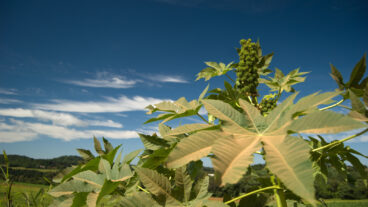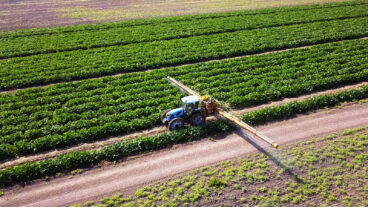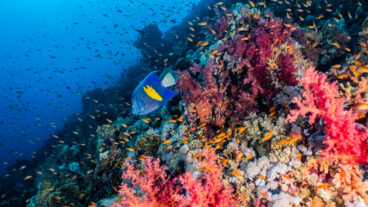Israelis are taking steps to nurture the historic environment of their country.
The “promise” of the Promised Land is in jeopardy. The Israelites were exiled time and again during numerous periods of history, only to return and to miraculously reclaim their land. As we enter the 21st century, however, the Holy Land itself is facing unholy and perhaps irreversible damage that even miracles may not repair. Water levels are at a catastrophic low, aquifers are under siege, air pollution has reached toxic levels, marine culture is disappearing and open spaces – the lungs of a nation – are being rapidly replaced with asphalt in Israel’s global race for economic survival.
It may be stating the obvious to explain why Americans should care. The Bible, after all, is steeped in beauty of this tiny piece of the earth, its changing seasons and luminous landscapes. Too often we think of this biblical legacy as a mere concept, as a place above and beyond reality. But you can actually touch the promised earth, be soothed by its waters and hear the wind’s ancient song as it performs for a towering Eucalyptus tree. The Kinneret (Sea of Galilee), the primary water source for Israel, inspired generations of prophets, rabbinical scholars, cabbalists and poets. Legend has it that the Well of Miriam, which quenched Jewish thirst through forty years of wandering in the desert, is buried deep within its cool embrace.
But can the full spiritual power of the biblical message be sustained if the reality it describes no longer exists? Or in the warnings of Isaiah (10:19): “The remnants of the trees of his forest will be so few that a child can write them down.”
Yet, as an Israeli businessman commented recently: “Even the worst situation offers the seeds of opportunity and progress.” Issues related to the Israeli “environment” and “ecosystem” – all but ignored as urgent elements of Israeli political discourse a few years ago – are increasingly viewed as human and national priorities by the Israeli public. The good news is that legions of dedicated Israelis are working against time to protect this precious legacy.
There were only a handful of environmental organizations in Israel a decade ago, but today there are more than 80 dynamic nonprofit and grassroots groups working to preserve the environment and a growing list of foundations. Gidon Bromberg, Israel Director of Friends of the Earth/Middle East, is leading the charge to save the endangered, and some would even say dying, Dead Sea. Bromberg almost single-handedly convinced the Israeli government, United Nations, European Union, Jordan and even the Palestinians to play constructive and supportive roles in this vital cause.
Every leading Israeli university is committing dollars and manpower to scientific breakthroughs in environmental fields. Tel Aviv University recently established the Porter School of Environmental Studies. The School will be housed in an innovative model of ecological architecture based on “green” technology, with the construction process itself utilized as a teaching tool. The School’s new Environmental Simulation Laboratory, funded by the Revson Foundation, is working with the city of Tel Aviv to anticipate and to avoid the negative environmental impact of urban development.
Urban and regional air pollution is not only generated by increased vehicle use and industrial expansion, but is also transported from other regions as far away as Europe or North Africa. Israel is creating more accurate forecasting methods for dangerous pollution episodes through the development of pollution atmospheric models.
Water quality deterioration results primarily from a combination of declines in water levels combined with overuse from escalating population growth. Israeli scientists are seeking solutions that will prevent salt intrusion from the sea into the country’s aquifers, will more effectively capture potable rainwater and will lead to more efficient water-saving techniques.
Israel’s corporate sector is taking important steps to comply with and even exceed environmental regulations.
Sano Bruno Enterprises Ltd., Israel’s largest manufacturer of non-food products, offers the widest range of domestic and industrial cleaning products and has won numerous Israeli environmental awards. The company was voluntarily adopting new technologies that met tough U.S. Environmental Protection Agency standards long before Israel’s current regulatory framework was firmly established. Government-industry working groups are by now a familiar part of the terrain.
Although Israel and the United Nations are at constant loggerheads in politics, Nesher Israel Cement Enterprises won the highly coveted United Nations Millennium Business Award for Environmental Achievement. Once regarded as a symbol of environmental pollution, particularly at its oldest plant near Haifa, Nesher is now considered a model for environmental protection. By incorporating the most modern technological advances and instilling a strong commitment to making them work, the company reduced particle emissions by 50 percent and dust emissions to practically zero.
Israel’s Environmental Ministry was created in 1988, with several employees, a few borrowed rooms and a budget insufficient to fix a broken sewage pipe. Today, the Ministry has over 30 divisions, a respected role in the Cabinet on a par with other ministries and a budget of more than $500 million. The ministry formulates and implements a comprehensive national environmental policy, develops and updates legislation and standards, ensures effective enforcement and supervision, promotes environment education and awareness, and advances regional and global environmental cooperation.
This story of how a tiny country with limited resources is forging a large commitment to the environment could serve as a model for a small or mid-sized U.S. city or state. A long list of terrorist attacks over the past few years, compounded by global and national recession, makes the achievement both all the more remarkable and yet difficult, given the harsh conditions ahead.
“Creation was dependent on God alone, whereas redemption depends also on us,” writes Israeli Rabbi Shlomo Riskin. “He will be, it will be, whenever we will help bring it about.”
This monthly column will be dedicated to the redeemers of the promise of the land, the enormous challenge before them and the positive lessons their achievements convey for American and Israeli communities alike.












